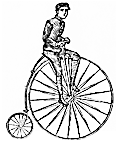Eddie Rickenbacker and the Air Lines
After returning home from World War I, Eddie Rickenbacker retained his interest in the potential of aviation, and was looking for opportunities. With the passage of the Air Mail Act of 1925, he joined Reed Chambers, his 94th Aero Squadron flying buddy, as a silent partner in Florida Airways, but this venture lasted less than a year.
In January 1928, Eddie took on the responsibilities as an assistant general manager for sales at General Motors. In June the following year Rickenbacker nudged General Motors into the aeronautics industry by encouraging the purchase of Fokker Aircraft Corporation of America. Following a series of disappointments, he resigned from General Motors in 1932 and went to work for a brief stint with American Airways.
In 1933, Rickenbacker moved back to General Motors when they offered him a position as Vice President of public relations in the new aeronautics division, which included Eastern Air Transport that would soon become known as Eastern Air Lines. Eddie was appointed general manager of Eastern Air Lines in January 1935.
By 1938, Eddie Rickenbacker had turned Eastern Air Lines into a very successful venture for General Motors. Through a series of events, Rickenbacker learned that General Motors intended to sell Eastern, Eddie raised $3.5 million in just one month, enough to purchase Eastern Air Lines.
At the time, just prior to World War II, all the airlines in America used government subsidies to stay financially sound. However, the only government money accepted by Eastern came from their Air Mail contracts, and this was money that Eastern Air Lines could sacrifice so they would be in complete control of their company without any government intervention. In 1939 Eddie Rickenbacker submitted a sealed bid of $0 for carrying the mails across south Texas, thus ending Eastern's ties with the federal government subsidies.
Following World War II, Eddie purchased the new Lockheed Constellations and Eastern Air Lines was the first airline to fly them. Eastern collaborated in designing the Constellation's successors: the Super-Constellation and the Electra. It also re-designed its operations to be open and responsive, as well as creating a training system that prepared entry level workers to move up the corporate ladder, thus insuring that Eastern Air Lines would have a long line of capable managers that knew the business from the ground up.
The pay-off to Eastern was that it became the most profitable airline in the country in the post-war era. In 1953, Eddie Rickenbacker resigned his title as president of Eastern Air Lines, only to become it's Chairman of the Board. He named his long time subordinate, Thomas Armstrong, as an acting president, while all the important decisions were still made by Eddie. Eddie hoped to eventually name his son William as president of Eastern, but William had no interest in joining the company.
As the Cold War intensified, Eddie's management ideas began to age. Eastern Air Lines was struggling to keep up with the intense competition. As the years passed, Eddie became less flexible and made a series of poor business decisions. One such decision was his insistence that Eastern continue using turboprop engines rather than newer jet engines being developed. This unwillingness to modernize the fleet started Eastern on a downward financial spiral. Eventually, the Board of Directors forced Eddie out as Eastern's CEO. However, Eddie Rickenbacker remained Chairman of the Board until December 31, 1963 when he officially retired from Eastern Air Lines.
Post-war Politics
Politically, Eddie was always an arch-conservative. He made no pretense about his feelings that the New Deal of the 1930s created in the United States a "socialized welfare state," and he had often spoke out on the subject.
As his duties at Eastern Airlines began to diminish after 1959, he devoted more time to speaking for conservative causes and, by his own account, opened "a new chapter in my public-address experience" with his hour-long speech to the Chicago Economic Club in April 1961. His speech, entitled "Conservatives Must Face Up to Liberalism," touched a nerve among his listeners; many of whom were from the economic and political elite of Chicago. Eddie eventually had the speech printed as a pamphlet, and he found many other opportunities to deliver similar addresses. Always a philanthropist, he divided the honoraria from these speeches, $300-$1000 per appearance, among 8 "uplift" organizations such as the Boys' Clubs, Big Brothers, and Boy Scouts of America. In 1957, Eddie donated his Bear Creek Ranch in Texas to the Boy Scouts.
Over the years, Eddie's tenor changed more than his political opinions. He seemed to grow increasingly bitter in his public utterances. He also injected disturbing racial imagery into his writings during the 1960s and 1970s as backlash against the Civil Rights movement. Even his opinions about world affairs changed from resistance to Communist ideological domination of the world, to fear of a Communist-inspired race war in Asia and Africa.
Next: Rickenbacker's Final Return to Columbus
See also:


